11 start with S start with S
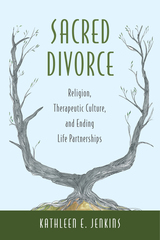
For more than five years, Jenkins observed religious support groups and workshops for the divorced and interviewed religious practitioners in the midst of divorces, along with clergy members who advised them. Her findings appear here in the form of eloquent and revealing stories about individuals managing emotions in ways that make divorce a meaningful, even sacred process. Clergy from mainline Protestant denominations to Baptist churches, Jewish congregations, Unitarian fellowships, and Catholic parishes talk about the concealed nature of divorce in their congregations. Sacred Divorce describes their cautious attempts to overcome such barriers, and to assemble meaningful symbols and practices for members by becoming compassionate listeners, delivering careful sermons, refitting existing practices like Catholic annulments and Jewish divorce documents (gets), and constructing new rituals.
With attention to religious, ethnic, and class variations, covering age groups from early thirties to mid-sixties and separations of only a few months to up to twenty years, Sacred Divorce offers remarkable insight into individual and cultural responses to divorce and the social emotions and spiritual strategies that the clergy and the faithful employ to find meaning in the breach. At once a sociological document, an ethnographic analysis, and testament of personal experience, Sacred Divorce provides guidance, strategies and answers to readers looking for answers and those looking to heal.
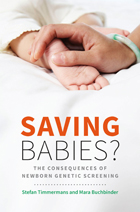
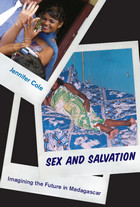
Sex and Salvation chronicles the coming of age of a generation of women in Tamatave in the years that followed Madagascar’s economic liberalization. Eager to forge a viable future amid poverty and rising consumerism, many young women have entered the sexual economy in hope of finding a European husband. Just as many Westerners believe that young people break with the past as they enter adulthood, Malagasy citizens fear that these women have severed the connection to their history and culture.
Jennifer Cole’s elegant analysis shows how this notion of generational change is both wrong and consequential. It obscures the ways young people draw on long-standing ideas of gender and sexuality, it ignores how urbanites relate to their rural counterparts, and it neglects the relationship between these husband-seeking women and their elders who join Pentecostal churches. And yet, as talk about the women circulates through the city’s neighborhoods, bars, Internet cafes, and churches, it teaches others new ways of being.
Cole’s sophisticated depiction of how a generation’s coming of age contributes to social change eschews a narrow focus on crisis. Instead, she reveals how fantasies of rupture and conceptions of the changing life course shape the everyday ways that people create the future.

In this updated edition of his fundamental study of modern marriage, John Scanzoni challenges the widespread assumption that marriage is a dying institution. By analyzing the "reward seeking" which generates conflicts between males and females, he shows that marriage indeed has a future but that its form will continue to change as sex-role equality emerges both within and outside of marriage.
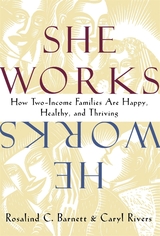
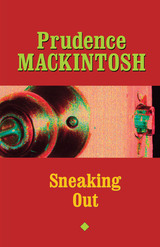
From the endless battles of sibling rivalry to the endless worries about getting indifferent students into—and then graduated from—college, raising boys is the adventure of a lifetime for any mother. Prudence Mackintosh has not only survived the adventure but has also written about it with her signature wit and style. Her essays about life with sons Jack, Drew, and William have entertained the readers of Texas Monthly and other prominent magazines for nearly three decades, offering solace to similarly beleaguered parents and a knowing chuckle to everyone who enjoys watching the real-life sitcom of a fundamentally happy, intact family.
Sneaking Out completes the story that Mackintosh began in her earlier books Thundering Sneakers and Retreads. In this collection of new and previously published essays, she recounts life with her adolescent sons as they race headlong to first jobs, first driver's licenses, first girlfriends, and first flights away from the family nest. She also follows them into the college years, when both parents and sons have to find a new balance in holding on and letting go. Along the way, she offers wise and witty reflections on being a woman at midlife, supporting her sons through the beginning of their adult lives and her parents through the end of theirs.
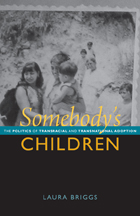
The dramatic expansion of transracial and transnational adoption since the 1950s, Briggs argues, was the result of specific and profound political and social changes, including the large-scale removal of Native children from their parents, the condemnation of single African American mothers in the context of the civil rights struggle, and the largely invented "crack babies" scare that inaugurated the dramatic withdrawal of benefits to poor mothers in the United States. In Guatemala, El Salvador, and Argentina, governments disappeared children during the Cold War and then imposed neoliberal economic regimes with U.S. support, making the circulation of children across national borders easy and often profitable. Concluding with an assessment of present-day controversies surrounding gay and lesbian adoptions and the struggles of immigrants fearful of losing their children to foster care, Briggs challenges celebratory or otherwise simplistic accounts of transracial and transnational adoption by revealing some of their unacknowledged causes and costs.

Ortiz defines the traditional sport marriage as a career-dominated marriage, illustrating how it encourages women to contribute to their own subordination through adherence to an unwritten rulebook and a repertoire of self-management strategies. He explains how they make invaluable contributions to their husbands’ careers while adjusting to public life and trying to maintain family privacy, managing power and control issues, and coping with pervasive groupies, overinvolved mothers, a culture of infidelity, and husbands who prioritize team loyalty. He gives these historically silent women a voice, offering readers perceptive and sensitive insight into what it means to be a woman in the male-dominated world of professional sports.
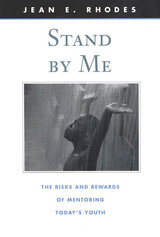
A child at loose ends needs help, and someone steps in--a Big Brother, a Big Sister, a mentor from the growing ranks of volunteers offering their time and guidance to more than two million American adolescents. Does it help? How effective are mentoring programs, and how do they work? Are there pitfalls, and if so, what are they? Such questions, ever more pressing as youth mentoring initiatives expand their reach at a breakneck pace, have occupied Jean Rhodes for more than a decade. In this provocative, thoroughly researched, and lucidly written book, Rhodes offers readers the benefit of the latest findings in this burgeoning field, including those from her own extensive, groundbreaking studies.
Outlining a model of youth mentoring that will prove invaluable to the many administrators, caseworkers, volunteers, and researchers who seek reliable information and practical guidance, Stand by Me describes the extraordinary potential that exists in such relationships, and discloses the ways in which nonparent adults are uniquely positioned to encourage adolescent development. Yet the book also exposes a rarely acknowledged risk: unsuccessful mentoring relationships--always a danger when, in a rush to form matches, mentors are dispatched with more enthusiasm than understanding and preparation--can actually harm at-risk youth. Vulnerable children, Rhodes demonstrates, are better left alone than paired with mentors who cannot hold up their end of the relationships.
Drawing on work in the fields of psychology and personal relations, Rhodes provides concrete suggestions for improving mentoring programs and creating effective, enduring mentoring relationships with youth.
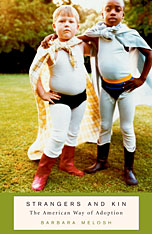
Strangers and Kin is the history of adoption, a quintessentially American institution in its buoyant optimism, generous spirit, and confidence in social engineering. An adoptive mother herself, Barbara Melosh tells the story of how married couples without children sought to care for and nurture other people's children as their own. It says much about the American experience of family across the twentieth century and our shifting notions of kinship and assimilation. Above all, it speaks of real people striving to make families out of strangers.
In the early twentieth century, childless adults confronted orphanages reluctant to entrust their wards to the kindness of strangers. By the 1930s, however, the recently formed profession of social work claimed a new expertise--the science and art of child placement--and adoption became codified in law. It flourished in the United States, reflecting our ethnic diversity, pluralist ideals, and pragmatic approach to family. Then, in the 1960s, as the sexual revolution reshaped marriage, motherhood, and women's work, adoption became a less attractive option and the number of adoptive families precipitously declined. Taking this history into the early twenty-first century, Melosh offers unflinching insight to the contemporary debates that swirl around adoption: the challenges to adoption secrecy; the ethics and geopolitics of international adoption; and the conflicts over transracial adoption.
This gripping history is told through poignant stories of individuals, garnered from case records long inaccessible to others, and captures the profound losses and joys that make adoption a lifelong process.
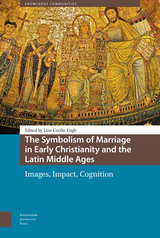
READERS
Browse our collection.
PUBLISHERS
See BiblioVault's publisher services.
STUDENT SERVICES
Files for college accessibility offices.
UChicago Accessibility Resources
home | accessibility | search | about | contact us
BiblioVault ® 2001 - 2024
The University of Chicago Press









